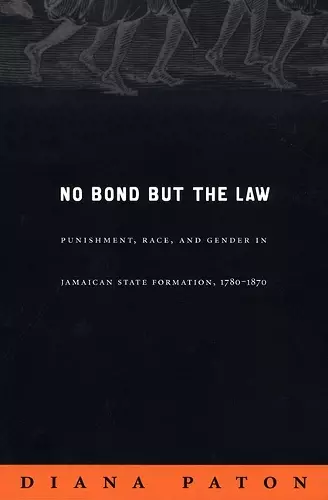No Bond but the Law
Punishment, Race, and Gender in Jamaican State Formation, 1780–1870
Format:Hardback
Publisher:Duke University Press
Published:29th Oct '04
Currently unavailable, and unfortunately no date known when it will be back

The author analyzes punishment as a way to explore the dynamic of state formation in a colonial society making the transition from slavery to freedom.
Investigating the cultural, social, and political histories of punishment during ninety years surrounding the 1838 abolition of slavery in Jamaica, Diana Paton challenges standard historiographies of slavery and discipline. The abolition of slavery in Jamaica, as elsewhere, entailed the termination of slaveholders’ legal right to use violence—which they defined as “punishment”—against those they had held as slaves. Paton argues that, while slave emancipation involved major changes in the organization and representation of punishment, there was no straightforward transition from corporal punishment to the prison or from privately inflicted to state-controlled punishment. Contesting the dichotomous understanding of pre-modern and modern modes of power that currently dominates the historiography of punishment, she offers critical readings of influential theories of power and resistance, including those of Michel Foucault, Pierre Bourdieu, and Ranajit Guha.
No Bond but the Law reveals the longstanding and intimate relationship between state formation and private punishment. The construction of a dense, state-organized system of prisons began not with emancipation but at the peak of slave-based wealth in Jamaica, in the 1780s. Jamaica provided the paradigmatic case for British observers imagining and evaluating the emancipation process. Paton’s analysis moves between imperial processes on the one hand and Jamaican specificities on the other, within a framework comparing developments regarding punishment in Jamaica with those in the U.S. South and elsewhere. Emphasizing the gendered nature of penal policy and practice throughout the emancipation period, Paton is attentive to the ways in which the actions of ordinary Jamaicans and, in particular, of women prisoners, shaped state decisions.
“No Bond but the Law is a model of research procedure and historical writing.”—Sidney Mintz, author of Sweetness and Power: The Place of Sugar in Modern History
“No Bond but the Law is one of the most interesting and intellectually ambitious works of scholarship to be published in the field of slave and emancipation studies in recent years. Diana Paton has written a book that takes several important conceptual matters and historiographies—emancipation, punishment, gender, and state formation—and puts them together in a remarkably compelling and original way.”—Steven Hahn, author of A Nation under Our Feet: Black Political Struggles in the Rural South from Slavery to the Great Migration
ISBN: 9780822334019
Dimensions: unknown
Weight: 572g
312 pages